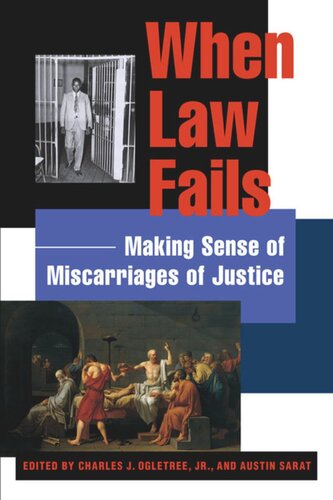

Most ebook files are in PDF format, so you can easily read them using various software such as Foxit Reader or directly on the Google Chrome browser.
Some ebook files are released by publishers in other formats such as .awz, .mobi, .epub, .fb2, etc. You may need to install specific software to read these formats on mobile/PC, such as Calibre.
Please read the tutorial at this link: https://ebookbell.com/faq
We offer FREE conversion to the popular formats you request; however, this may take some time. Therefore, right after payment, please email us, and we will try to provide the service as quickly as possible.
For some exceptional file formats or broken links (if any), please refrain from opening any disputes. Instead, email us first, and we will try to assist within a maximum of 6 hours.
EbookBell Team

4.1
90 reviewsSince 1989, there have been over 200 post-conviction DNA exonerations in the United States. On the surface, the release of innocent people from prison could be seen as a victory for the criminal justice system: the wrong person went to jail, but the mistake was fixed and the accused set free. A closer look at miscarriages of justice, however, reveals that such errors are not aberrations but deeply revealing, common features of our legal system.
The ten original essays in When Law Fails view wrongful convictions not as random mistakes but as organic outcomes of a misshaped larger system that is rife with faulty eyewitness identifications, false confessions, biased juries, and racial discrimination. Distinguished legal thinkers Charles J. Ogletree, Jr., and Austin Sarat have assembled a stellar group of contributors who try to make sense of justice gone wrong and to answer urgent questions. Are miscarriages of justice systemic or symptomatic, or are they mostly idiosyncratic? What are the broader implications of justice gone awry for the ways we think about law? Are there ways of reconceptualizing legal missteps that are particularly useful or illuminating? These instructive essays both address the questions and point the way toward further discussion.
When Law Fails reveals the dramatic consequences as well as the daily realities of breakdowns in the law’s ability to deliver justice swiftly and fairly, and calls on us to look beyond headline-grabbing exonerations to see how failure is embedded in the legal system itself. Once we are able to recognize miscarriages of justice we will be able to begin to fix our broken legal system.
Contributors: Douglas A. Berman, Markus D. Dubber, Mary L. Dudziak, Patricia Ewick, Daniel Givelber, Linda Ross Meyer, Charles J. Ogletree, Jr., Austin Sarat, Jonathan Simon, and Robert Weisberg.